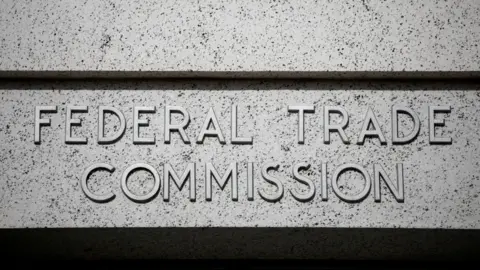Landmark antitrust trial could force Zuckerberg to sell Instagram
 Reuters
ReutersA trial in the landmark antitrust case against social media giant Meta kicked off in Washington on Monday.
Lawyers for the US competition and consumer watchdog allege Meta unlawfully quashed rivals by purchasing Instagram and WhatsApp over a decade ago.
"They decided that competition was too hard and it would be easier to buy out their rivals than to compete with them," said Federal Trade Commission (FTC) lawyer Daniel Matheson.
Meta countered that the lawsuit from the FTC, which reviewed and approved those acquisitions, is "misguided."
Meta "acquired Instagram and WhatsApp to improve and grow them alongside Facebook," the company's attorney Mark Hansen argued.
A win by the FTC could force CEO Mark Zuckerberg break up the company.
That could include spinning off photo sharing app Instagram and messaging service WhatsApp.
The FTC says the company overpaid when it acquired Instagram for $1 billion in 2012. Two years later, it purchased the WhatsApp for $19 billion.
"The [FTC's] argument is the acquisition of Instagram was a way of neutralising this rising competitive threat to Facebook," says Rebecca Haw Allensworth, a professor of antitrust law at Vanderbilt Law School.
Ms Allensworth says Mr Zuckerberg's own words, including those from his emails, may offer the most convincing evidence at trial.
"He said it's better to buy than to compete. It's hard to get more literal than that," Ms Allensworth says.
On Monday, Matheson referenced a 2012 memo from Zuckerberg in which he discusses the importance of "neutralising" Instagram. Matheson called the message "a smoking gun."
Meta, on the other hand, said the purchases made the consumer experience better.
"Acquisitions to improve and grow" have never been found unlawful, Hansen said Monday, "and they should not be found unlawful here."
The company maintains that it faces competition from a slew of other apps, including TikTok, X, YouTube, and iMessage.
Mr Zuckerberg and the company's former chief operating officer Sheryl Sandberg are both expected to testify at the trial, which could run for several weeks.
Shifting politics
The case, FTC v Meta, was filed during US President Donald Trump's first administration but risks becoming politicised during his second term.
Mr Zuckerberg has lobbied Trump in person to have the FTC drop the case, according to the Wall Street Journal.
When asked by the BBC to confirm that report, Meta sidestepped the question but said in a statement: "The FTC's lawsuits against Meta defies reality."
"More than 10 years after the FTC reviewed and cleared our acquisitions, the commission's action in this case sends the message that no deal is ever truly final," a Meta spokesperson told the BBC.
Relations between Mr Zuckerberg and Trump had been frosty partly because Trump was barred from Meta's social media platforms after the US Capitol riot in January 2021.
Since then, the relationship has thawed somewhat.
Meta contributed $1m (£764,400) to Trump's inaugural fund, and has added former Trump adviser Dina Powell McCormick and Ultimate Fighting Championship (UFC) boss Dana White, a Trump ally, to Meta's board of directors this year.
The company also announced in January that it was doing away with independent fact-checkers and had agreed to pay Trump $25 million to settle a lawsuit over the suspension of his accounts after the 6 January Capitol riots in 2021.
'A very clear message'
President Trump's move to fire two FTC commissioners in March also hangs over the case.
As Democrats, Rebecca Kelly Slaughter and Alvaro Bedoya were in the minority on the five-seat commission.
Until Wednesday, just two seats of those seats were filled, both by Republicans. Another Republican was confirmed by the Senate on Thursday.
Slaughter and Bedoya - who are suing the Trump administration to be reinstated - say the move to push them out was meant to intimidate.
"The president sent a very clear signal not only to us but to Chairman Ferguson and Commissioner [Melissa] Holyoak that if they do something he doesn't like, he could fire them too," Slaughter told the BBC in a recent interview.
"So if they don't want to do a favour for his political allies, they're on the chopping block as well," Slaughter said.
Slaughter and Bedoya both expressed alarm at recent reports about Zuckerberg's lobbying efforts.
"My hope is that there is no political interference," Mr Bedoya told the BBC.
 Reuters
ReutersThe FTC did not respond to a request for comment from the BBC.
Ferguson, who was appointed as FTC chair by Trump, recently told The Verge he would "obey lawful orders" when asked what he would do if the president directed him to drop a lawsuit like the one against Meta.
Ferguson added that he would be very surprised if anything like that ever happened.
The FTC is considered a key antitrust watchdog. In recent years, it has returned hundreds of millions of dollars to victims of fraud, in addition to passing laws that ban junk fees and subscription traps.
But as the Meta trial begins, it's among the many independent regulatory agencies that the administration seems keen to rein in.
Chair Ferguson is also recently quoted reaffirming his belief that independent regulatory bodies are "not good for democracy."
The FTC's 'uphill battle'
FTC v Meta begins as another major antitrust case - USA v Google - gets set to enter what's known as the remedies phase.
The Department of Justice won the first phase of that case last summer when Judge Amit Mehta found that Google holds a monopoly in online search, with a market share of around 90%.
Last month, the DOJ reiterated a demand made during the Biden administration that a court break up Google's search monopoly.
The FTC's case against Meta will be tougher to prove, says Laura Phillips-Sawyer, an associate professor of business law at the University of Georgia.
"I think they have a real uphill battle," Ms Phillips-Sawyer said of the FTC.
"They have a long road before any consideration of divestiture of Instagram or WhatsApp is considered."
That's because compared to online search, there's more competition in the personal network services space that Meta operates in, Ms Phillips-Sawyer said.

Sign up for our Tech Decoded newsletter to follow the world's top tech stories and trends. Outside the UK? Sign up here.
